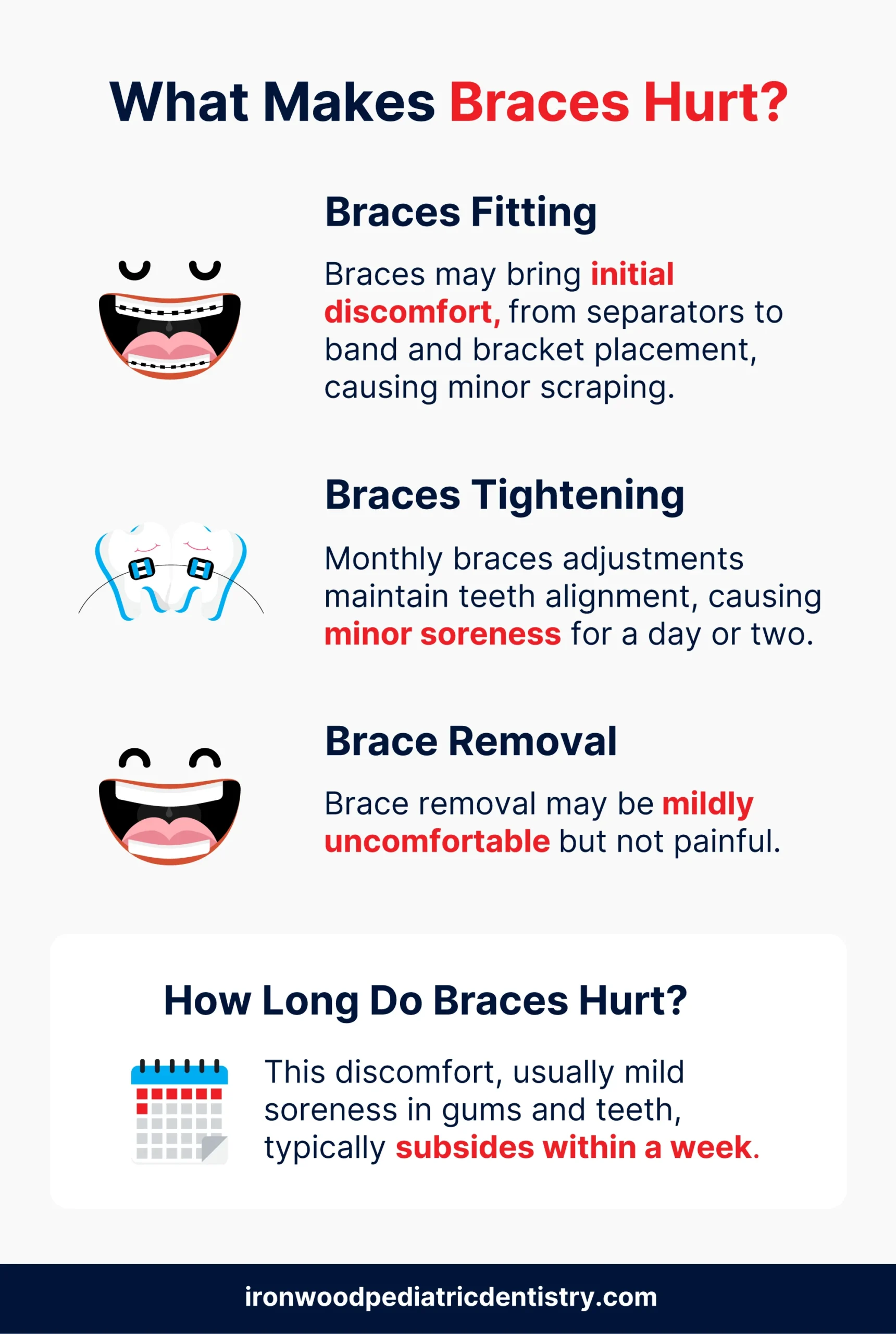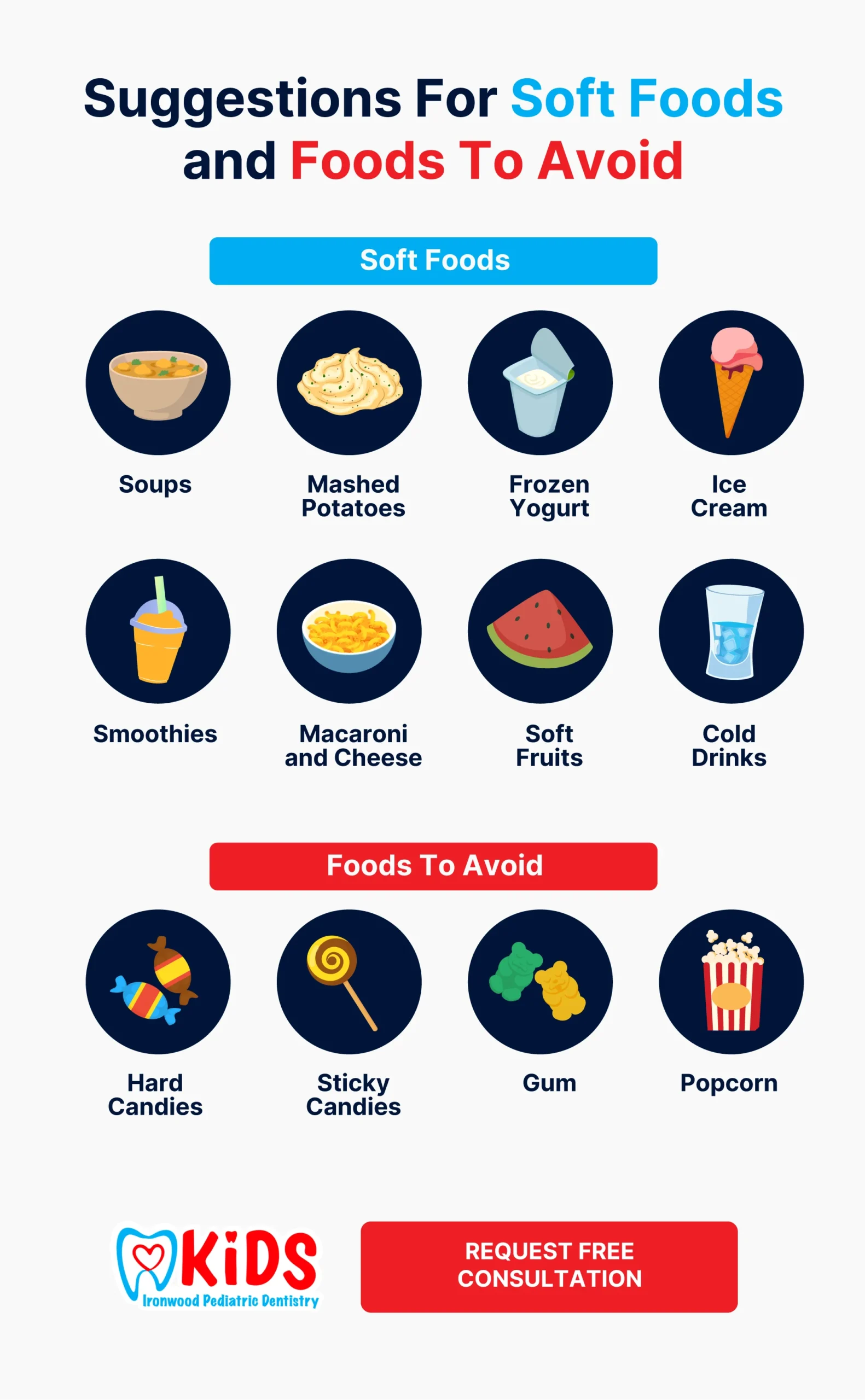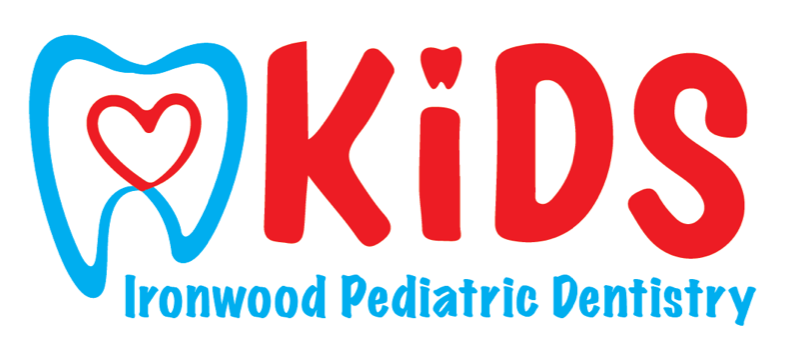Do Braces Hurt?
Home Pediatric Dentistry Do Braces Hurt?
There are some things that by their appearance alone can suggest a painful experience. For many of our child clients, braces—with their brackets, wires, and elastic bands—often fall squarely into this category.
The good news is, modern braces technology has significantly reduced the chance that wearing, adjusting, and removing braces will cause any significant pain or discomfort.
At Ironwood Dental, we use the latest orthodontic devices, materials, and methods to make sure that your child’s braces experience is as comfortable as possible from the initial assessment appointment all the way through to when we remove them. To set up a consultation with one of our Scottsdale orthodontists, call us at (480) 422-4544.
Especially if it’s your first child with braces (and/or if you never had them yourself), you may find yourself unprepared for the questions your son or daughter asks about the pain—namely, do braces hurt? This guide will help both of you navigate the experience confidently.
What Makes Braces Hurt?
Braces work by gradually moving your teeth through pressure. This process is so gradual that it should not be painful. Still, some mild to moderate discomfort is completely normal, and can happen at three points during your child’s braces journey: when they are initially placed, during adjustments, and when they are removed.
How Long Do Braces Hurt?
This discomfort can take the form of mild soreness in the gums and teeth, but in most cases it should last no more than a few days, up to about a week, before subsiding.
Discomfort When Braces are Placed on the Teeth
The time when your orthodontist first puts braces on your child’s teeth is understandably a point when some tooth and gum discomfort can occur. This is because the teeth and gums will need to adjust to the new presence of brackets and wires where there were none the day before.
This initial process can begin even before the braces go in, if separator devices or “spacers” between the teeth are needed to prepare them one or two weeks ahead of time. These devices can cause some temporary soreness, but it should go away quickly.
When your orthodontist places the braces themselves in your child’s mouth, in some cases this involves putting bands around the molars and brackets on the other teeth. Band placement can require the application of some pressure to the jaws, but should not cause pain. In many cases today, bands are not needed and brackets go onto all the teeth.
Once your orthodontist puts the brackets in place, the next step will be to connect them with a wire, followed by the final step of attaching rubber bands to fix the wire in position. This can cause some minor scraping on the insides of the cheeks.
Also, some children will impulsively feel the urge to “explore” their new braces with the tips of their tongues, which can also lead to some minor scraping there as well.
During this brief period of discomfort, over-the-counter pain relief medications and eating a diet of soft foods is usually all that is needed until the soreness subsides.
When Your Braces Are Adjusted
Braces need regular adjustment as your child’s teeth slowly change position. These adjustments usually come at about one-month intervals, and consist of seeing your orthodontist regularly to tighten the wire and bracket bands to maintain their pressure on the teeth to keep moving in the right direction.
Each time the braces are tightened, your child may experience the same minor discomfort that the initial placement of the braces can cause. This will mainly be minor soreness in the teeth and gums for one or two days afterward.
Like with treating discomfort that follows the initial placement of braces on the teeth, treating mouth soreness after a braces adjustment taking over-the-counter pain relievers should alleviate pain.
When Your Braces Are Removed
When the day comes that your orthodontist removes your child’s braces, usually after one to three years of wearing them, the removal of brackets, wires, elastics, and bands can be mildly uncomfortable but should not cause any pain or significant discomfort.
Many times, once braces are removed, your child will still need to wear a retainer device. These devices should cause no discomfort.

Things You Can Do at Home to Ease Braces Pain
Although wearing braces should not be a painful experience, there are some things you can do to help your child to cope with the mild discomfort and soreness that can follow the initial placement, adjustment, or removal of braces. Here are some specific recommendations we make for our Scottsdale orthodontic patients:
- Eat soft foods. The less pressure your child puts on his or her teeth, the less likely it is that eating will add to any discomfort from wearing braces. Cold foods ice cream can also help to minimize braces pain. The table below offers some suggestions for soft foods, and identifies some foods to avoid.
Foods for Sore Teeth and Gums | Foods to Avoid |
|
|
- Place ice on the gums. Ice can be an effective anti-inflammatory and mild pain reliever for braces discomfort. Putting an ice pack covered with a cloth on the outside of the cheek for about 20 minutes should help reduce inflammation.
- Use an orthodontic wax. When brackets and wires irritate the inner cheeks or the inner lips against the front teeth, an orthodontic wax can be an effective buffer. These waxes are non-toxic and can be easily removed before eating or brushing the teeth.
- Use oral anesthetics. In addition to over-the-counter medications, in some cases applying a topical oral anesthetic to teeth and gums can provide additional relief for tooth and gum soreness.

When It Is Time to Call Your Scottsdale Orthodontist
Sometimes, the cause of orthodontic-related mouth pain can be more related to the gradual movement of teeth. This is especially so if a problem occurs like a loose or broken archwire, or a band or bracket breaking or coming loose.
If this happens, then it is time to call your orthodontist to correct the problem. In the meantime, applying an orthodontic wax to the area of the breakage can help to prevent causing pain and discomfort to the inner cheeks or lips.
Another time when it is a good idea to call your orthodontist is if your child experiences significant pain after braces placement or adjustment, or if discomfort lasts for longer than one week or after taking over-the-counter pain medications. This will give us the chance to see if any adjustments need to be made or if something else is the cause.
Call Ironwood Dental Today
Making your child’s braces experience as pain-free and comfortable as possible while still producing healthy, pleasing smiles is what we do at Ironwood Dental in Scottsdale, Arizona. Our orthodontic team has decades of combined experience in applying orthodontic treatments for helping children to keep their teeth healthy and straight with minimal risk of pain or significant discomfort.
If your child is experiencing discomfort or pain because of getting braces, there is something you can do about it. Call us at (480) 422-4544, to schedule an appointment with one of our Scottsdale orthodontists. Or, if you have a question or prefer to schedule an appointment online, you can reach us here.
There is no reason why your child should suffer for wearing braces. Call us at Ironwood Dental today for an orthodontic appointment, so we can stop any braces pain he or she may be feeling.

